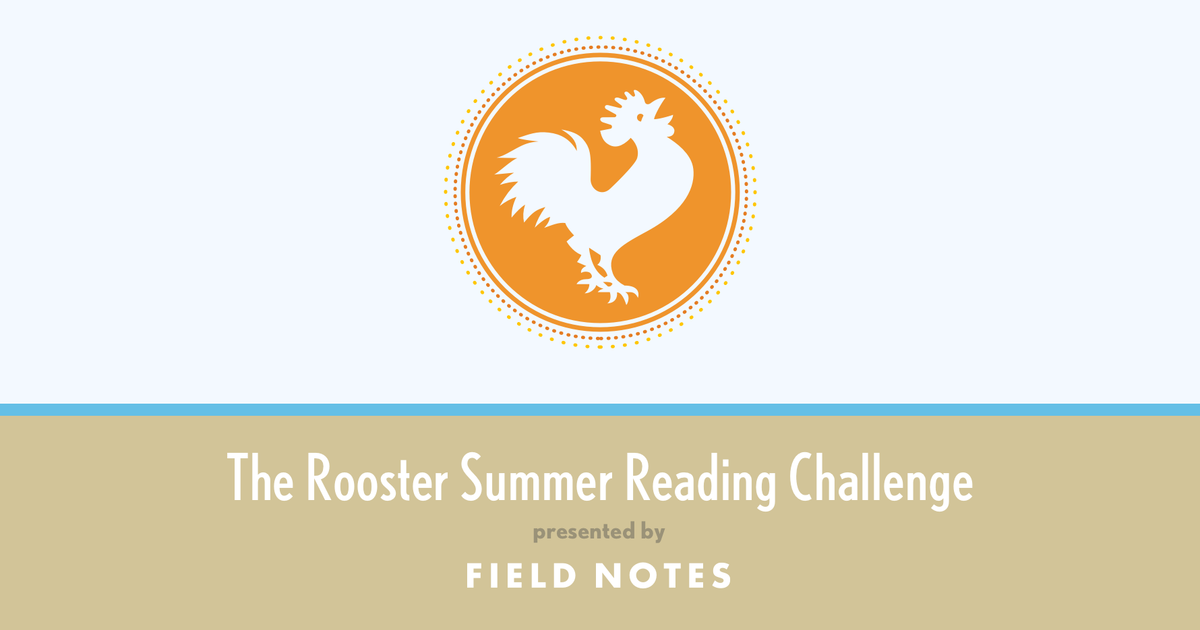The Rooster Summer Reading Challenge: Week Nine
The final month of the 2017 Rooster Summer Reading Challenge kicks off with the first book in our August matchup, Temporary People. All month long we'll be joined by Rachel Khong, in conversation with Nozlee Samadzadeh.

Welcome to the Rooster Summer Reading Challenge, brought to you by The Morning News Tournament of Books and our presenting sponsor, Field Notes. All summer long, we’re reading two novels a month and reconvening on Wednesdays to discuss the books. Joining our chats is a monthly guest judge, who at month’s end decides which title heads to our summer championship on Aug. 30—when you choose which book gets an automatic berth in the 2018 Tournament of Books.
For August we’re reading Temporary People by Deepak Unnikrishnan (selected by the ToB Committee) and Fever Dream by Samanta Schweblin (chosen by Victor LaValle, who joined us in June), with novelist Rachel Khong.
- Plan your summer reading: Temporary People (finish by Aug. 9); Fever Dream (first half by Aug. 16, finish by Aug. 23)
- Catch up on previous chats: A Separation (first half, second half), The Night Ocean (first half, second half), Ill Will (first half, second half), Marlena (first half), second half)
- Jump into this week’s discussion in the comments
Andrew Womack: Last week we finished our July matchup and our judge for the month, Amelia Gray, chose Ill Will to move ahead to our summer finale, where it will meet our June finalist, The Night Ocean, and one of the two books we’re reading for August: Temporary People or Fever Dream. This week we’re discussing the first half of Temporary People, through page 118.
Today we’re also excited to welcome our August judge, Rachel Khong, who will be in conversation all month long with ToB Producer Nozlee Samadzadeh. Make sure to check out Rachel’s just-released debut novel, Goodbye, Vitamin, which was published in July. And we should also pour out some kefir for the excellent, late Lucky Peach, where Rachel was executive editor.
Thank you so much for joining us, Rachel. Now take it away, Nozlee!
Nozlee Samadzadeh: Rachel, once I decide to read a book, I try not to find out too much about it—one of the only things I knew about Temporary People going in is that it’s linked short stories.
Rachel Khong grew up in Southern California, and holds degrees from Yale University and the University of Florida. From 2011 to 2016, she was the managing editor then executive editor of Lucky Peach magazine. Her fiction and nonfiction have appeared in Tin House, Joyland, American Short Fiction, the San Francisco Chronicle, The Believer, and California Sunday. She lives in San Francisco. Goodbye, Vitamin is her first novel.
Nozlee Samadzadeh is the ToB producer and a developer at Vox Media.
That said, let’s provide a little more context than that for folks reading along. Temporary People deals with foreign (“pravasi” in Malayalam, the language of many of the Indian characters in the book) laborers in the United Arab Emirates. These workers are vital to the continued hyperbolic growth of cities like Dubai and Abu Dhabi, but they’re prevented from seeking permanent citizenship in their adopted country—they’re temporary people. In Deepak Unnikrishnan’s telling, this itinerancy leads to fantastical states of metamorphosis: Construction workers fall off buildings and get stapled back together; students’ tongues fall out, letting their words scatter far and wide; children living in an aging apartment building become convinced they must appease one of the building’s elevators, which they blame for a series of molestations.
Are you a big pre-reading review reader (or a big short story reader), in general?
Rachel Khong: Not only am I not a pre-reading review reader, I’m also not a pre-viewing or pre-listening review reader. I’ll read reviews only after I’ve consumed the thing. (For example, I only watched the trailer for Get Out after watching Get Out, and felt the trailer gave way too much away!) Which is to say, going into Temporary People, I knew even less than you: I’d gathered, from being on the internet, that it was a debut novel about migrant workers in the UAE. And that was pretty much the extent of it. That it was linked short stories came as a surprise to me. A pleasant surprise, though. I love short stories and story collections. During a year in college, having committed myself to writing stories, I read a short-story collection a week; through middle and high school I killed many an evening at Costco in the book section reading the Best American Short Stories while my parents shopped.
But it’s hard to imagine any of these finding a place in a volume like that: The stories in Temporary People seem to work as a unit, and are a little more puzzling to consider as individual stories. But there’s a definite rhythm and mood and momentum to them; despite the often grisly content, the writing itself is beautiful and striking. I had to read one story after another because if I looked up or took a break I felt spun around. I had to sort of ease back into the world after reading this. I’m not sure if I’m saying this as a good or bad thing—I think good. But when I read them story by story, something was lost: Some of the intensity vanished.
How was the experience of reading these stories for you? How did you approach this? Was it story by story or gulping them down?
Nozlee: I go through phases of being a pretty terrible reader, leaving my book in my bag or on my bedside table while I spend hours staring at my fresh horrors device instead. I try not to beat myself up about it. Lately, the only time I can get myself to open a book is on my commute to work, so I read Temporary People in 40-minute chunks. “Momentum” feels like the right word here—I probably diluted some of the intensity for myself by playing chicken with the book like that!
This is Unnikrishnan’s first book, and in interviews he’s said that this started as a more traditional collection before morphing into a linked set of stories. Your first novel, Goodbye Vitamin, also started as a short story. What is it like to realize that the limits of a form aren’t enough for the story you want to tell?
Rachel: The short story that Goodbye, Vitamin grew from was called “Today Is a Fish”; the narrator of that story shares a profession and dark sense of humor with the Ruth who narrates my novel. For me, writing a novel was more an experiment in staying a little longer in Ruth’s voice, and then realizing a pretty obvious thing: that the same set of preoccupations of the story were there, present in the novel, along with some additional others. And in the novel, I had more pages to explore them—to let characters be real people, and ideas take up space. I suspect that most writers have the same three or five themes rolling around in our brains, and I wonder if Unnikrishnan found that to be true; I wonder if seeing his preoccupations and obsessions side by side like that, in story after story, started to dictate the book’s form.
But I always wonder about the word “linked,” why we use that term, and all the expectations that come along with it. Because all short-story collections seem to me linked thematically. (Like, is Jesus’ Son a linked collection? Is The Coast of Chicago? Because they’re perfect.) So I often wonder if saying the word “linked” serves a story collection. In theory it means that the whole entity will be greater than the sum of its parts, and that sounds like a fine goal. But it could also be an excuse to justify less-than-fully-realized individual stories. What are your thoughts in general about linked story collections?

Field Notes Limited-Edition for Summer is Campfire. Campfire features three original photos that have been line-screened and carefully spot-printed, for a vintage feel, and each pack comes with a custom “Campfire Master” patch, ready for your scout sash or messenger bag.
Nozlee: My ultimate example of a “linked” short-story collection (and the winner of the 2011 Rooster!) is A Visit From the Goon Squad, although I know a lot of ink was spilled at the time about whether it was a novel or short stories or neither. Cynically, I want to ask whether “linked” short stories are a marketing ploy invented in the years since Jesus’ Son—we know that short stories don’t sell as well, so maybe this helps move books.
Rachel: Do you think that the linking—or the form in general—serves Temporary People?
Nozlee: I do! Here the linking creates a sense that all these stories happen in the same universe, which helped ground me enough to quickly accept people turning into suitcases (“Gulf Return”) and seeds growing into laborers (“In Mussafah Grew People”).
The combination of magical realism and dystopia in Temporary People reminded me a lot of George Saunders. That said, I have this theory that there are two kinds of people in the world: people who love George Saunders's work and people who just don’t get it. Today I’m coming out as being in the latter camp. (Gasp, I know.) Which kind of person are you? Did that make the book work for you or not?
Rachel: I’m in the loving-George-Saunders camp for sure, and my tent stakes are driven deeply into the sand. I have to confess, though, that I just read Lincoln in the Bardo and didn’t love it as wholeheartedly as I wanted to. It’s interesting that we’ve been talking about stories versus novels. Despite its being novel-length, Lincoln felt somehow more thin than his stories. And while I’m perfectly open to the magical-realism-plus-dystopia combo, I don’t think that necessarily translates to my liking Temporary People or not. The approaches are so different. And I think Saunders might be responsible for me being more suspicious of fantastical stories, executed less expertly: My eyebrows go up when the premise of a story or work is supposed to do the heavy lifting of making us feel things. I’m happy to be taken somewhere unexpected, but not for an expected reason, you know? There were moments in Temporary People where I thought, Oh I’ve been here before. Here’s a Westworld or Ex Machina-type ethical question of: What makes a person a person? In Temporary People, the question is: If we create people, in this case grow workers like plants, are they real people? Does this push that question or bring anything new to it? Does it address it in a different way? Or does it make us feel it more deeply? And though the images are surprising and stunning—the people being grown on plants and hanging like bats—I’m not sure yet.
But wait, Nozlee, you aren’t getting off the hook for this! Can we talk about what you dislike? Did you have an anti-Saundersian reaction to Temporary People?
Nozlee: I knew I wouldn’t get away just saying that! I’ve read two of Saunders’s collections (CivilWarLand in Bad Decline and Tenth of December) and both left me feeling cold. I would start a story, understand its depressing or dystopian schtick, and then lose interest because the characters existed more to fuel the premise than to come to life as real people in my head. (I might have just made most of the ToB community hate me. Yell at me in the comments!)
I agree with your questions here about how the book is doing the heavy lifting, and some of the stories in Temporary People answered them better than others for me. For example, I really liked “Le Musée,” which expanded on the story of the Malayalam scientist who grows humans “In Mussafah Grew People,” via the perspective of his wife’s roman à clef about their lives and his daughter reckoning with that history years after their deaths. The story gave me the narrative investment and emotional backstory I was craving after a half-dozen shorter, more abrupt narratives.
Rachel: I liked “Le Musée,” too, for those same reasons. I don’t know if I liked “Mushtibushi,” the story about mysterious child molestation blamed on an elevator, but it was hard to look away from and made me super uncomfortable. I totally understand craving more emotional and historical heft, but I felt like the lack of it did, at times, make perfect sense, given the subject matter and the literal temporary-ness of these workers’ lives. That the point is these really forceful images, packed one on top of the other. And sometimes that’s literally all the “stories” are: “Pravasis,” for example, is simply a list of professions (“Smuggler. Hooker. Tea boy. Mistress. Temporary. People.”). Did you feel that his experimentation with form is working in these shorter, more abrupt pieces? Or if not standing alone, did you feel they worked as a whole?
Nozlee: I thought I wouldn’t have patience for the more experimental “chabters” of the book (a cheeky reference to how an Arabic speaker would pronounce the word “chapter”), but I ended up really liking them for the latter reason—they made the book cohere for me. Let’s see how that cohesion continues in the second half of the book next week!

